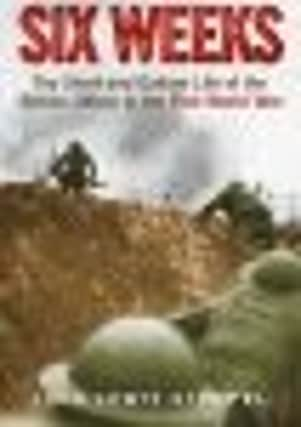Book review: Six Weeks by John Lewis-Stempel


A subaltern, or second lieutenant, was sometimes aged no more than 17 and yet he was often first over the top, the last to retreat and had a life expectancy of just six weeks in the trenches.
Lewis-Stempel’s moving and inspirational book recreates the brief but brilliant lives of the officers whose war was ‘something like a holocaust’.
Advertisement
Hide AdAdvertisement
Hide AdBrave, tireless and honourable, these young men were the baby-faced backbone of the British army and yet, complains Lewis-Stempel, they have been airbrushed out of our history.
‘It is quite possible to pick up a modern school textbook on the Great War,’ he says, ‘and find that the frontline British officer merits not a mention.’
Lewis-Stempel’s compelling account of these doomed young warriors fills that glaring gap and is a fitting and humbling memorial to what they did and how they did it.
Subalterns were the most junior commissioned officers. They were in charge of a platoon of about 50 men and, together with lieutenants and captains, were the single most important factor in Britain’s victory on the Western Front.
Advertisement
Hide AdAdvertisement
Hide AdJunior officers came almost exclusively from public schools where Officers’ Training Corps parade grounds had produced young men schooled in courage, patriotism, selfless service and leadership.
Their patriotism is often ridiculed by contemporary historians and culture vultures who see the Great War’s combatants not as heroes but merely ‘pitiable, conned victims’.
And yet, the sheer smiling bravery of junior officers in the face of death and their devotion to the welfare of their men left an indelible mark on the other ranks who remained forever loyal to what were sometimes boys only weeks out of school.
What made the junior officer so vulnerable to extinction during the first two years of the war was the British system of officer-led patrolling. Dressed in his distinguishing uniform, revolver in hand and arm signalling his men to move forward, he was a prime target for enemy guns.
Advertisement
Hide AdAdvertisement
Hide AdFew infantry officers went over the top with an expectation of avoiding injury or death – at Loos in 1915, some battalions lost every single one of their officers and on July 1 1916, the first day of the Battle of the Somme, 993 officers were scythed down like stalks of wheat.
Their worst nightmare was not dying but the fear of showing fear and to this end, the pipe or cigarette was an indispensable prop, literally helping them to keep a stiff upper lip.
One captain wrote that a cigarette ‘helps a man go to his death with a brave hypocrisy of carelessness, just as it helped the (French) aristocrat go daintily to the guillotine’.
Any subaltern running away during battle could expect a bullet in the back but over the course of the entire war, only two British Army officers were found guilty of cowardice or desertion and executed.
Advertisement
Hide AdAdvertisement
Hide AdFor some, the comradeship and fascination of battle made the long, dragging years endurable. In his last letter home before he was killed, Lt Wilfred Owen, whose poems often cynically savage the whole concept of war, wrote: ‘It’s a great life, you would not be visited by a band of friends half so fine as surround me here.’
The chivalric and paternal code of the officer was hard to escape, even for those not wholly convinced of the legality of the conflict, but the ultimate death toll was staggering and shocking.
Of the 37,500 officers who perished in the war, about 22,000 of them were public schoolboy subalterns – Eton alone lost 1,157 boys.
Not since the Wars of the Roses had the aristocracy been so systematically slaughtered and yet in the cruellest of ironies, as observed by historian David Cannadine, their selfless and stoic sacrifice was ‘in defence of a country that was gradually but irrevocably ceasing to be theirs’.
Advertisement
Hide AdAdvertisement
Hide AdLewis-Stempel’s admirable book takes us through every aspect of the officers’ lives from action in the frontline trenches to leisure time, injury, death and the aftermath of war.
‘After spending two years in the ghosts of their company, I find it hard to not like and admire the young officers,’ he writes. ‘They were golden and rare. They pleasantly sabotage stereotypes...all that we have, and the freedoms we hold dear, are because of the sacrifice of the thin khaki line of 1914-18.’
(Weidenfeld & Nicolson, hardback, £20)